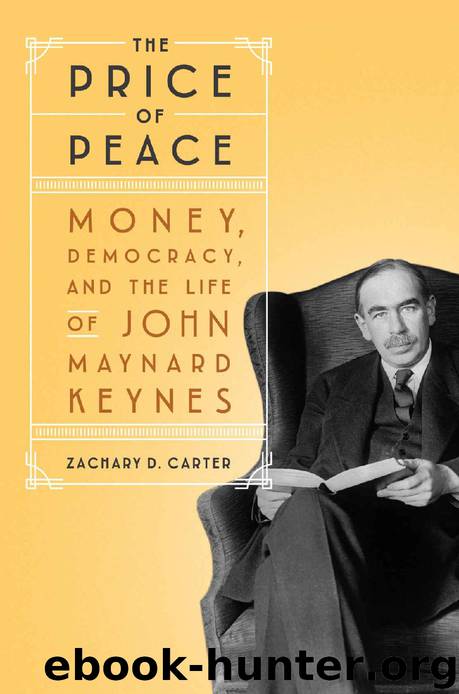The Price of Peace by Zachary D. Carter

Author:Zachary D. Carter [Carter, Zachary D.]
Language: eng
Format: epub
Publisher: Random House Publishing Group
Published: 2020-05-19T04:00:00+00:00
* * *
—
By 1938, Walter Lippmann was perhaps the most influential American man of letters. His column for the New York Herald Tribune was syndicated nationwide, and though his employer was a bastion of Wall Street Republicanism, the fluidity of his ideological commitments had earned him a reputation for objectivity and open-mindedness. As a young writer, he had transitioned smoothly from a socialist to a Wilsonian to a staunch critic of the Treaty of Versailles. But the ease with which he assimilated new ideas had become chaotic during the Great Depression as he struggled to come to terms with social breakdown and new forms of authoritarian government rising around the globe. He had initially celebrated FDR’s policy agenda, going so far as to publicly advocate temporary dictatorial powers for the president, and touted The General Theory as the theoretical breakthrough key to conquering the Depression. But he had since grown uncomfortable with the power FDR’s government wielded, a concern inflamed by discussions with Hayek and Mises. He had half-heartedly voted for Republican Alf Landon in 1936 but by 1938 was ready to present a systematized attack on the Roosevelt administration with his book The Good Society. In it, he denounced the New Deal as a form of “gradual collectivism” that had accomplished nothing but “the conferring of privileges upon selected interests.” Like Stalinism and fascism, Lippmann claimed, the New Deal was a species of “absolutism” that existed “in rebellion against the moral heritage of western society” and threatened a “relapse into barbarism.” “There are…important differences between lions and tigers, even between African and Indian lions. But from the point of view of, let us say, a goat or a lamb, the common characteristics of all the great carnivores are more significant than their differences.”82 So, too, with the New Deal, fascism, and communism.
In his introduction, Lippmann acknowledged the influence of Hayek and Mises, economists who remained, for the moment, all but unknown outside academic circles. But even as Lippmann railed against Roosevelt’s agenda, he proposed a set of policy prescriptions that seemed perfectly compatible with Keynesian and New Deal sensibilities: public works, a social safety net, progressive taxation to limit excessive wealth, and a sustained attack on corporate monopoly power. He even praised Keynes by name next to Hayek and Mises. However bad the New Deal might be, a return to the “corporate collectivism” of “Old Guard Republicanism” would not do. The result, as Lippmann’s biographer Ronald Steel observed, is a “perplexing” work of “confusion” that merely “tacked on” a popular policy agenda to a totally incompatible intellectual argument.83
Or so it seemed looking backward from the 1980s. In the 1930s, Lippmann saw himself participating in an ideological project to redefine liberalism for an age of political and economic turmoil—the same project that Keynes had attempted a dozen years earlier in The End of Laissez-Faire. And it made sense to group Hayek, Mises, and Keynes together. They all still called themselves liberals and considered themselves inheritors of the same Enlightenment intellectual tradition.
Download
This site does not store any files on its server. We only index and link to content provided by other sites. Please contact the content providers to delete copyright contents if any and email us, we'll remove relevant links or contents immediately.
International Integration of the Brazilian Economy by Elias C. Grivoyannis(111059)
The Radium Girls by Kate Moore(12028)
Turbulence by E. J. Noyes(8049)
Nudge - Improving Decisions about Health, Wealth, and Happiness by Thaler Sunstein(7707)
The Black Swan by Nassim Nicholas Taleb(7129)
Rich Dad Poor Dad by Robert T. Kiyosaki(6632)
Pioneering Portfolio Management by David F. Swensen(6300)
Man-made Catastrophes and Risk Information Concealment by Dmitry Chernov & Didier Sornette(6019)
Zero to One by Peter Thiel(5802)
Secrecy World by Jake Bernstein(4753)
Millionaire: The Philanderer, Gambler, and Duelist Who Invented Modern Finance by Janet Gleeson(4478)
The Age of Surveillance Capitalism by Shoshana Zuboff(4292)
Skin in the Game by Nassim Nicholas Taleb(4248)
The Money Culture by Michael Lewis(4207)
Bullshit Jobs by David Graeber(4190)
Skin in the Game: Hidden Asymmetries in Daily Life by Nassim Nicholas Taleb(4007)
The Dhandho Investor by Mohnish Pabrai(3765)
The Wisdom of Finance by Mihir Desai(3747)
Blockchain Basics by Daniel Drescher(3583)
